
2019 IACC Workshop
Addressing the Mental Health Needs of People on the Autism Spectrum
 Full Meeting Video
Full Meeting Video
 Photo Gallery
Photo Gallery
 Announcement
Announcement
| Topic | Topic Description |
|---|---|
| Date: | Tuesday, May 21, 2019 |
| Time: | 8:30 a.m. to 5:00 p.m. ET |
| Place: | Hilton Washington DC/Rockville Hotel and Executive Meeting Center 1750 Rockville Pike Rockville, MD 20852 |
| Metro Stop: | Twinbrook Metro Station (Red Line) |
| Registration: | Pre-registration is recommended to expedite check-in. Seating in the meeting room is limited to room capacity and on a first come, first served basis. Onsite registration will also be available. Register |
| Remote Access: | Conference Call: Dial: 800-369-3119 Access code: 5777378 Webcast: https://videocast.nih.gov/ If you experience technical problems with the webcast or conference call, please call 240-668-0302 or e-mail IACCPublicInquiries@mail.nih.gov. |
| Agenda: | The workshop will focus on mental health issues in people on the autism spectrum, including anxiety, depression, suicide, self-injurious and aggressive behavior, and mental health services. |
| Cost: | The meeting is free and open to the public. |
| Deadlines: | Notification of intent to present oral comments: Friday, May 10, 2019, by 5:00 p.m. ET Submission of written/electronic statement for oral comments: Tuesday, May 14, 2019, by 5:00 p.m. ET Submission of written comments: Tuesday, May 14, 2019, by 5:00 p.m. ET Webcast live feedback comments: No pre-registration required. For more information, visit the Live Feedback page. Please note: Written public comments and statements accompanying oral public comments should be sent to IACCPublicInquiries@mail.nih.gov. For IACC Public Comment guidelines please see:http://iacc.hhs.gov/meetings/public-comments/guidelines/ |
| Public Comment: | The IACC invites oral and written public-related comments relevant to the topic of the workshop. Individuals interested in presenting oral comments must notify the Contact Person listed on this notice by 5:00 p.m. ET on Friday, May 10, 2019, with their request to present oral comments at the meeting, and a written/electronic copy of the oral presentation/statement must be submitted by 5:00 p.m. ET on Tuesday, May 14, 2019.
Expand for more 
A limited number of slots for oral comment are available and will be assigned on a first come, first serve basis. Only one representative of an organization will be allowed to present oral comments at this meeting; other representatives of the same group may provide written comments. If the oral comment session is full, individuals who could not be accommodated are welcome to provide written comments instead. Comments to be read or presented in the meeting will be assigned a 3-minute time slot, but a longer version may be submitted in writing for the record. Commenters going beyond their allotted time in the meeting may be asked to conclude immediately to allow other comments and presentations to proceed on schedule.
Any interested person may submit written public comments to the IACC prior to the meeting by e-mailing the comments to IACCPublicInquiries@mail.nih.gov or by submitting comments at the link: https://iacc.hhs.gov/meetings/public-comments/submit/index.jsp by 5:00 p.m. ET on Tuesday, May 14, 2019. The comments should include the name, address, telephone number and when applicable, the business or professional affiliation of the interested person. NIMH anticipates written public comments received by 5:00 p.m. ET on Tuesday, May 14, 2019, will be presented to the working group prior to the workshop. Any written comments received after the by 5:00 p.m. ET on Tuesday, May 14, 2019 deadline through Monday, May 20, 2019, will be provided to the working group either before or after the meeting, depending on the volume of comments received and the time required to process them in accordance with privacy regulations and other applicable Federal policies. All written public comments and oral public comment statements received by the deadlines for both oral and written public comments will be provided to the IACC for their consideration and will become part of the public record. Attachments of copyrighted publications are not permitted, but web links or citations for any copyrighted works cited may be provided. Individuals may also submit public comments to the IACC via a Live Feedback Form accessible from the webcast page on the day of the meeting from 9:00 AM ET to 11:00 AM ET. No pre-registration required. The link will be accessible on the NIH Videocast website and instructions are available on the IACC website: https://iacc.hhs.gov/meetings/iacc-meetings/live-feedback.shtml This format is best suited for brief questions and comments for the committee. Submissions will be provided to the IACC and will become a part of the public record. Core Values:
In the 2016-2017 IACC Strategic Plan, the IACC listed the "Spirit of Collaboration" as one of its core values, stating that, "We will treat others with respect, listen with open minds to the diverse views of people on the autism spectrum and their families, thoughtfully consider community input, and foster discussions where participants can comfortably where participants can comfortably offer opposing opinions.” In keeping with this core value, the IACC and the NIMH Office of Autism Research Coordination (OARC) ask that members of the public who provide public comments or participate in meetings of the IACC also seek to treat others with respect and consideration in their communications and actions, even when discussing issues of genuine concern or disagreement. |
| Disability Accommodations: | All IACC Full Meetings provide Closed Captioning through the NIH videocast website. Remote CART is provided through a web application and will be available at all meetings; the application can be used on a laptop computer or mobile device. For details please inquire with the Contact Person listed on the notice.
Individuals whose full participation in the meeting will require special accommodations (e.g., sign language, or interpreting services, etc.) must submit a request to the Contact Person listed on the notice at least seven (7) business days prior to the meeting. Such requests should include a detailed description of the accommodation needed and a way for the IACC to contact the requester if more information is needed to fill the request. Special requests should be made as early as possible; last minute requests may be made but may not be possible to accommodate. |
| Security: | Visitors will be asked to show one form of identification (for example, a government-issued photo ID, driver’s license, or passport) and to state the purpose of their visit. Also, as a part of security procedures, attendees should be prepared to present a photo ID at the meeting registration desk during the check-in process. Pre-registration is recommended. Seating will be limited to the room capacity and seats will be on a first come, first serve basis, with expedited check-in for those who are pre-registered.
Meeting schedule subject to change. Information about the IACC is available on the website: https://iacc.hhs.gov. |
| Contact Person: | Ms. Angelice Mitrakas Office of Autism Research Coordination National Institute of Mental Health, NIH 6001 Executive Boulevard, NSC, Room 7218 Rockville, Maryland 20852 Phone: 301-435-9269 E-mail: IACCPublicInquiries@mail.nih.gov |
Back to Top
 Agenda
Agenda
| Time | Event | ||||||||||
|---|---|---|---|---|---|---|---|---|---|---|---|
| 8:30 a.m. | |||||||||||
| 9:30 |
Addressing the Mental Health Needs of People on the Autism Spectrum – An Overview and Path Forward
|
||||||||||
| 10:00 |
Break
|
||||||||||
| 10:15 |
Personal Perspectives on Mental Health Issues in ASD
|
||||||||||
| 11:00 | |||||||||||
| 11:30 |
Discussion of Public Comments
|
||||||||||
| 11:45 |
Anxiety and OCD with ASD
|
||||||||||
| 12:35 p.m. |
Lunch
|
||||||||||
| 1:35 |
Depression and Suicide
|
||||||||||
| 2:55 |
Break
|
||||||||||
| 3:10 |
Self Injurious Behaviors (SIB) and Aggression
|
||||||||||
| 4:00 |
Mental Health Services Issues for People on the Autism Spectrum
|
||||||||||
| 4:30 |
Wrap Up
|
||||||||||
| 5:00 |
Closing Remarks and Adjournment
|
Schedule is subject to change. Meeting may end prior to or later than 5:00 PM depending on the needs of the committee. For more information on upcoming events, please see https://iacc.hhs.gov/meetings/
Next IACC Full Committee Meeting:
- Wednesday, July 24, 2019
Back to Top
 Speakers
Speakers
Carla Mazefsky, Ph.D.
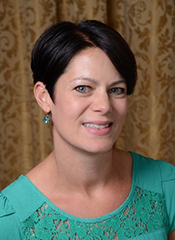
Dr. Carla Mazefsky is an Associate Professor at the University of Pittsburgh. She is the Director of the Regulation of Emotion in ASD Adults, Children, & Teens (REAACT) Research Program, which investigates emotion regulation and associated mental health and behavioral concerns in autism spectrum disorder (ASD). Her current studies focus on school-aged youth through young adults, including those with intellectual disability and challenging behavior as well as those who are verbal with average or better cognitive ability. Her studies involve investigations of mechanisms underlying emotion regulation in ASD and the development of new assessment and treatment approaches. She is co-editor of the soon-to-be published Oxford Handbook of Co-Occurring Psychiatric Conditions in Autism, author of the Emotion Dysregulation Inventory, and co-author of the Emotion Awareness and Skills Enhancement (EASE) Program. She is currently running a multisite randomized controlled clinical trial of EASE for verbal 12- to 21-year-olds with ASD, developing a version of EASE for youth and adults with ASD and co-occurring intellectual disability, and oversees the Autism Inpatient Collection study on the ASD specialty inpatient unit at UPMC Western Psychiatric Hospital.
Lindsey Nebeker

Ms. Lindsey Nebeker is a Development Specialist at the Autism Society of America and also works professionally as a presenter. She was featured in the Emmy-nominated documentary film Autism in Love, which followed the romantic relationships of four autistic adults, including her own relationship with her now husband Dave Hamrick. As a sibling to an autistic adult with high support needs, she is also strongly focused on the message of presuming competence for all people regardless of their labels. Ms. Nebeker holds a B.A. Degree in Music Technology from the College of Santa Fe and is a Partners in Policymaking graduate.
Dennis Mashue
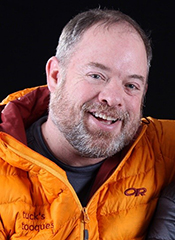
Mr. Dennis Mashue is an autistic advocate, speaker, writer, and social entrepreneur. He founded the OuterSelf Initiative (OSI) after a Kindergarten parent petitioned to have his autistic son segregated out of general education. OSI provides wilderness-based experiences and coaching for neurodivergent people, their families, educators, and employers. He and his autistic son, Tuck, co-founded Tuck’s Tooques Himalayan Headwear in 2012, as their answer to the 80-90% unemployment rate faced by autistic adults. With help from a Nepali expedition guide, he re-purposed his life to prepare Tucker for a sustainable, independent livelihood. In 2016, they set out on a 1-year #vanlife road-school adventure. They loaded their old minivan with camping gear, kayaks, mountain bikes, and Tuck’s Tooques winter hats, and visited 49 national parks in 32 states. Though minimally-verbal, Tuck spoke in front of 3,000-ish people about neurodiversity and self-employment. Tuck’s company video has over 200,000 views. Dennis received a B.S. in Public Relations/Journalism from Central Michigan University.
Alison Morantz, J.D., Ph.D.
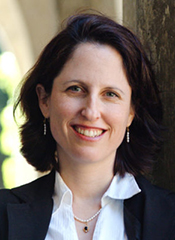
Dr. Alison Morantz is the James and Nancy Kelso Professor of Law at Stanford University. She is also the Director of the Stanford Intellectual and Developmental Disabilities Law and Policy Project (SIDDLAP), an interdisciplinary initiative that examines the rights and welfare of individuals with intellectual and developmental disabilities (I/DD), and serves as a Senior Fellow and Steering Committee Member of the Stanford Institute for Economic Policy Research (SIEPR). Her research examines the rights of individuals with I/DD, the regulation of workplace safety, and the enforcement of protective labor laws. She is also a founding board member of Disability Voices United, a California nonprofit directed by and for individuals with I/DD of all ages and their families. Dr. Morantz earned her undergraduate degree from Harvard University and went on to receive a M.Sc. in Economics of Development at the University of Oxford, a J.D. from Yale Law, and a Ph.D. in Economics from Harvard University. She worked as a union-side labor lawyer and antidiscrimination advocate in Boston before joining the Stanford faculty in 2004.
Connor Kerns, Ph.D.
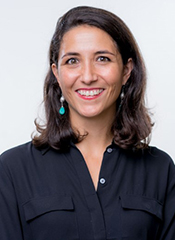
Dr. Connor Kerns is a Clinical Psychologist and Assistant Professor at the University of British Columbia. Her research interests include assessment and treatment of ASD, childhood anxiety, and stress-related disorders (including trauma-related disorders) in children with and without ASD. Her work explores sources and manifestations of anxiety and stress in people on the autism spectrum with the aim of developing and testing new clinical assessment tools and psychotherapies. Dr. Kerns has received federal and private grant funding for her research and has published and presented internationally on her findings. Autism Institute in Philadelphia. She earned an M.A. and Ph.D. in Psychology from Temple University. Additionally, she completed specialized clinical training in ASD, anxiety disorders, OCD and pediatric psychology at the Mount Sinai School of Medicine in New York City, AI Dupont Hospital for Children in Wilmington, DE, the Department of Psychiatry at University of Pennsylvania and the Children’s Hospital of Philadelphia, in Philadelphia, PA.
Judy Reaven, Ph.D.
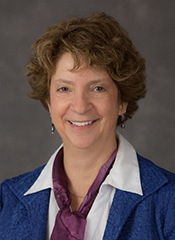
Dr. Judy Reaven is an Associate Professor in the Departments of Psychiatry and Pediatrics at the University of Colorado Anschutz Medical Campus. She is also the Associate Director of JFK Partners (Colorado UCEDD) as well as Director of Research for JFK Partners/Developmental Pediatrics at UC- School of Medicine. Her clinical and research interests include identifying and treating the co-occurrence of mental health symptoms in youth with Autism Spectrum Disorder. She is the primary developer of a cognitive behavior therapy (CBT) group treatment intervention for anxiety symptoms in children and adolescents with ASD (Facing Your Fears). She is particularly interested in the implementation of Facing Your Fears in “real-world” settings, including schools and mental health clinics. Dr. Dr. Reaven has been the PI on research grants funded by private foundations and federal agencies. She is currently PI on a grant focused on the modification of FYF for low income and/or underrepresented racial/ethnic minority youth in school settings. She has co-authored numerous peer-reviewed publications and book chapters. Dr. Reaven completed her undergraduate degree from Vanderbilt University, her Ph.D. in Clinical Psychology from the University of Missouri – Columbia, and a post-doctoral fellowship in developmental disabilities from the University of Colorado Anschutz Medical Campus.
Katherine Gotham, Ph.D.
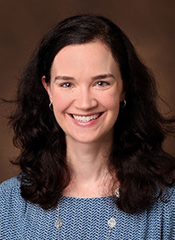
Dr. Katherine Gotham is an Assistant Professor in the Department of Psychiatry and Behavioral Sciences at Vanderbilt University Medical Center. She studies affect and emotion processing in autism spectrum disorder. Her current work focuses on depression as a leading source of clinical impairment in adolescents and adults on the autism spectrum. Dr. Gotham uses behavioral and psychophysiological measures and methods to identify shared mechanisms across ASD and depression. Her ultimate goal is to translate mechanistic research to assessment and treatment protocols that promote emotional health across the lifespan in ASD. Her previous research sought to improve the accuracy and extend the utility of common autism diagnostic instruments, and she is an author on the Autism Diagnostic Observation Schedule (ADOS-2). Dr. Gotham earned her Ph.D. from the University of Michigan.
Anne Kirby, Ph.D., OTR/L
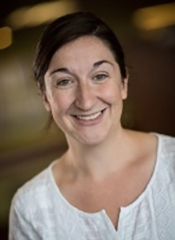
Dr. Anne Kirby is an Assistant Professor of Occupational & Recreational Therapies at the University of Utah. Her research focuses on individuals with autism spectrum disorder and their families, with an emphasis on suicide risk and prevention as well as preparing youth and families for successful transition to adulthood. She has worked with people on the autism spectrum for over 15 years. As an occupational therapist, she worked as in early intervention and charter school settings with children with a variety of special needs. She also worked as an inpatient occupational therapist at Walter Reed Army Medical Center. Dr. Kirby earned her M.S. in Occupational Therapy from the University of New Hampshire and her Ph.D., in Occupational Science from the University of North Carolina at Chapel Hill. As an assistant professor, she enjoys bridging research and practice, mentoring students in research, and preparing the next generation of occupational therapists for innovative and effective practice.
Darren Hedley, Ph.D.
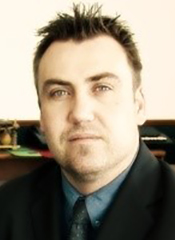
Dr. Darren Hedley is a Research Fellow at the Olga Tennison Autism Research Centre (OTARC) at La Trobe University, Melbourne, Australia. His research focus has two primary streams. Stream 1 examines employment in adults with ASD, focusing on social impact factors and the barriers and facilitators to workplace success. Stream 2 examines co-occurring mental health concerns in ASD with a focus on depression, anxiety and suicide. Prior to joining OTARC, Dr. Hedley completed a clinical fellowship in neurodevelopmental pediatric psychology at the Ohio State University in the Child Development Center of Nationwide Children's Hospital. He specialized in assessment and diagnosis of children with intellectual and developmental disability, including ASD. He then relocated to Boston where he worked in the Facial Affective and Communicative Expressions (F.A.C.E.) lab at Emerson College in the Department of Communication Sciences and Disorders. This research used motion capture, eye-tracking, and bio-physiological measures to investigate how children with ASD integrate and produce verbal and nonverbal information, such as facial expressions and language. Dr. Hedley earned his Ph.D. in Psychology from Flinders University, South Australia.
Sarah Cassidy, M.Sc., Ph.D.
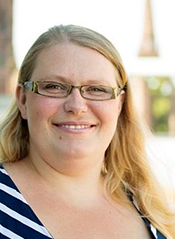
Dr. Sarah Cassidy is an is an Assistant Professor at the University of Nottingham. She is currently a visiting researcher at the ARC Cambridge and at the Institute of Neuroscience at Newcastle University. She is the Principal Investigator on the Mental Health in Autism project as well as the first Psychological Autopsy study in autism. Her research program aims to better assess, understand and prevent mental health problems, suicidal thoughts, and suicidal behaviors in autistic adults. She believes in working in partnership with those affected by her research to help ensure her research and campaign for changes to research, policy, and practice are useful to autistic people. Before joining the University of Nottingham as an Assistant Professor in 2017, Dr. Cassidy started her own research group at Coventry University. Prior to that she spent two years as a post-doctoral researcher at the Autism Research Centre (ARC), University of Cambridge. Dr. Cassidy earned an M.Sc. and Ph.D. from the University of Nottingham.
Matthew Siegel, M.D.
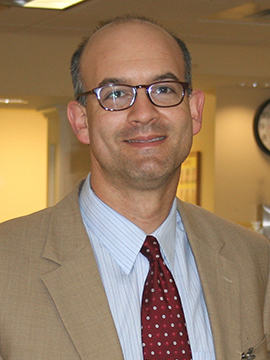
Dr. Siegel is the Vice President of Medical Affairs within the Developmental Disorders Service at Maine Behavioral Healthcare, Associate Professor of Psychiatry and Pediatrics at Tufts University School of Medicine, and Faculty Scientist at Maine Medical Center Research Institute. He has developed a continuum of treatment and research for individuals with autism, intellectual disability, co-occurring mental illness and challenging behaviors. He is the Principal Investigator of the Autism and Developmental Disorders Inpatient Research Collaborative (ADDIRC), a network of specialized child psychiatry units performing a multi-site study of severe autism and modeling use of biological sensors to predict the onset of challenging behaviors. Dr. Siegel is nationally recognized for his expertise in inpatient care for individuals with developmental disorders. He serves on the Autism and Intellectual Disability Committee of the American Academy of Child & Adolescent Psychiatry and is a co-author of the Academy’s Practice Parameter on the Assessment and Treatment of Children and Adolescents with Autism Spectrum Disorder. Dr. Siegel attended Amherst College, Stanford Medical School and trained at Brown University in child psychiatry, psychiatry, and pediatrics.
Craig Erickson, M.D.
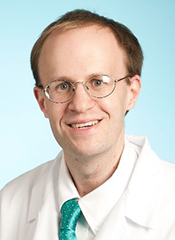
Dr. Craig Erickson is an Associate Professor at the UC Department of Psychiatry and Behavioral Neuroscience. Dr. Erickson specializes in research and clinical treatment involving persons with developmental disorders. His primary research focus is on new treatment development for Fragile X Syndrome, autism spectrum disorders, and other related disorders. He is the director of the Fragile X Research and Treatment Center and the Director of Research at the Kelly O'Leary Center for Autism Spectrum Disorders at Cincinnati Children’s Hospital. He is the inventor or co-inventor on patents focused on translational treatment development in neurodevelopmental disorders that are held at Cincinnati Children's Hospital Medical Center and at his previous employer the Indiana University School of Medicine. Dr. Erickson also enjoys teaching future child psychiatrists and mentoring junior faculty in the behavioral and developmental neuropsychiatry sub-field of child psychiatry. Dr. Erickson earned his M.D. from the University of Cincinnati College of Medicine.
Brenna B. Maddox, Ph.D., LCP
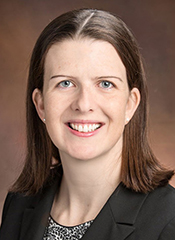
Dr. Brenna Maddox is a postdoctoral fellow and clinical psychologist at the Penn Center for Mental Health, located at the University of Pennsylvania. Her research program focuses on the intersection of autism services and implementation science. Her postdoctoral research, funded by the National Institute of Mental Health and the FAR Fund, aims to improve community mental health services for adults on the autism spectrum. Her clinical interests include the assessment and treatment of commonly co-occurring difficulties within autism, such as anxiety and depression, and the community diagnosis of autism spectrum disorder in adults. She received her M.S. in Clinical Psychology and Ph.D. in Clinical Psychology from Virginia Tech. She completed her predoctoral internship at the Children’s Hospital of Philadelphia as the Autism track intern.
Back to Top
 Materials
Materials
- Materials Related to Workshop (PDF – 283 KB)
Back to Top
 Slides
Slides
- IACC Workshop Full Slide Set (PDF 22 MB)
Back to Top
 Public Comments
Public Comments
- Oral Public Comments (PDF – 189 KB)
- Written Public Comments (PDF – 228 KB)
Back to Top
- Meeting Transcript (PDF – 2 MB)
Back to Top













